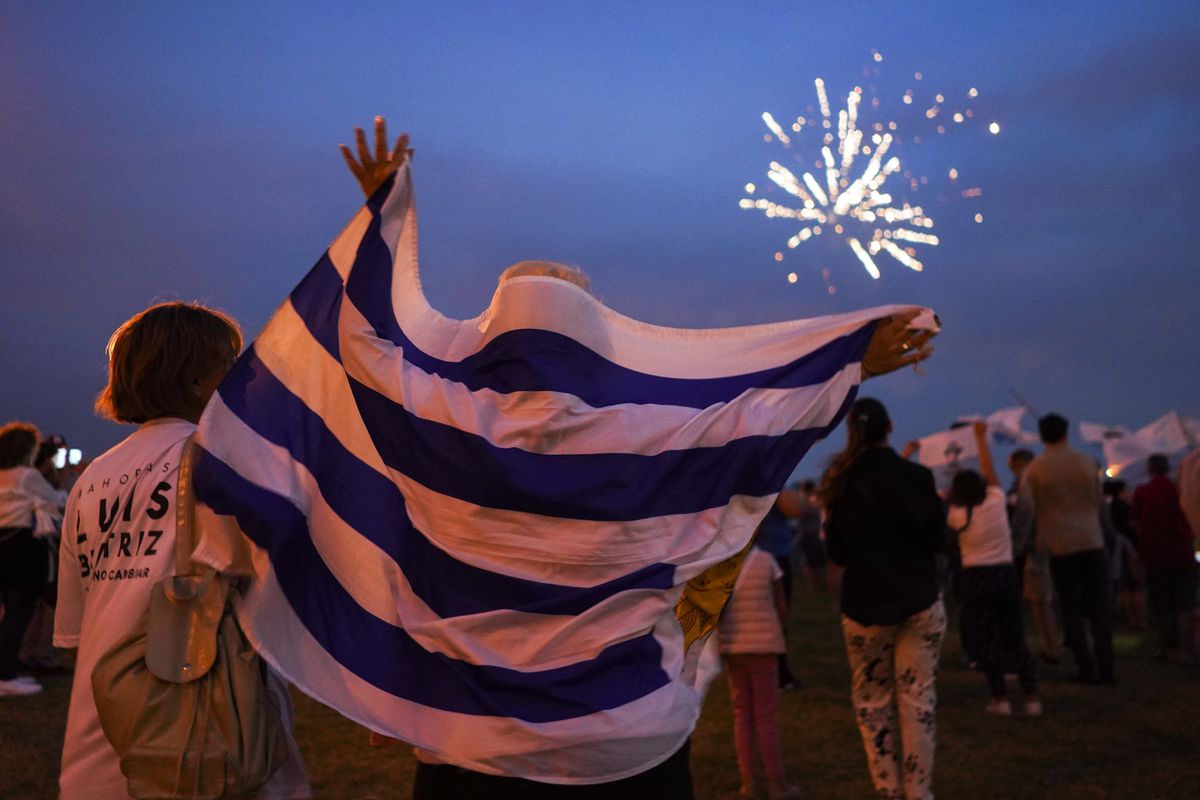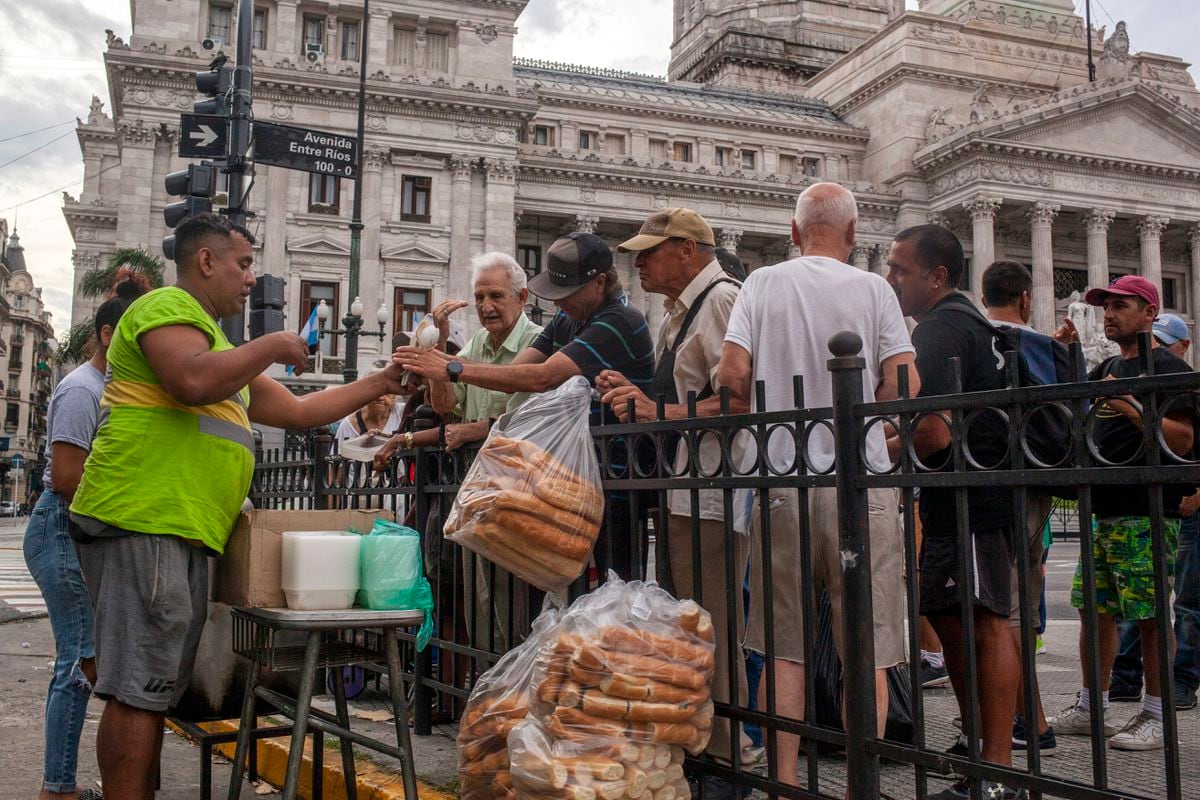Is democracy in Latin America in crisis?
4:25
(CNN) -
If you followed the biggest headlines from Latin America and the Caribbean in 2021, the prospects for democracy in the region could have looked pretty bleak.
Nicaragua, Cuba and Venezuela are on the list of nominees for the antidemocratic state actors of the year.
In Nicaragua, in elections widely discredited as a sham, President Daniel Ortega won a fourth consecutive term.
In Cuba, a brief — and rare — spark of popular protest was brutally crushed in a manner typical of the island's government.
And in Venezuela, President Nicolás Maduro expelled electoral observers from the European Union who said there were some irregularities during the November elections.
Outside of that famous triumvirate, several runners-up were also cause for concern.
The populist leaders of Brazil and Mexico are at opposite ends of the political spectrum, but both have been accused of undermining democratic institutions.
advertising
Elections in Latin America in 2022: the keys to the political movement in the region
Is democracy threatened in Latin America?
3:14
The young president of El Salvador jokes about being called a dictator.
Corruption is still rampant in Guatemala.
"There is a threat of contagion, of diffusion, of these authoritarian tendencies," David Altman, professor of political science at the Catholic University of Chile, told CNN.
"It is a deep concern."
Polls support those fears.
Only 43% of those surveyed in 22 countries in Latin America and the Caribbean were "satisfied" or "very satisfied" with the functioning of democracy in their country, according to the Latin American Public Opinion Project (LAPOP) in the Pulse Vanderbilt University's 2021 Democracy Survey.
The detriment of democracy in Latin America turned into authoritarianism
Spontaneous protests in Cuba that ignited in July over a lack of food and medicine amid an economic crisis exacerbated by the covid-19 pandemic and US sanctions were met with overwhelming repression from Cuban authorities.
Subsequent protests, scheduled for November, were preemptively crushed, and the authorities prevented some activists from leaving their homes.
This week, dozens of July 11 protesters received decades-long sentences, according to the US State Department.
The protests in Cuba and the memory of the "Maleconazo": can the current situation be compared with what happened in 1994?
Thousands of protesters in Cuba demand freedom 3:58
In Venezuela, Maduro's ruling party claimed victory over 20 of the 23 governorates in the November elections, an overwhelming defeat that, according to the opposition, was manipulated from the start.
Election observers from the European Union said the elections were held in better conditions than previous rounds, yet they refused to hold free or fair elections, citing irregularities including how certain candidates were arbitrarily barred from running, access unevenness from other parties to the media, and how the government monitored the votes of state workers.
Maduro expelled them from the country and called them "spies" who roamed freely in the country "spying on ... social, economic and political life."
But the most impressive democratic collapse in the region came from Nicaragua.
Who is Daniel Ortega, the four-time president of Nicaragua seeking reelection in questioned elections
Lawyer rules out Nicaragua's free election 5:52
The Ortega regime has tended to authoritarianism for years;
however, few predicted how quickly the country would transform into what many experts now call a true dictatorship.
Intense political repression began in June, when dozens of prominent opposition figures were arrested on vague national security charges.
Many of those arrested were candidates or potential candidates in the Nicaraguan presidential elections.
One by one, the Ortega regime locked up any credible opposition, paving the way for the November elections that Ortega overwhelmingly won.
Meanwhile, in Brazil, President Jair Bolsonaro has launched a sustained attack on various democratic institutions in his country.
Earlier this year, he recalled many of the dark days of his country's military dictatorship, after passing a military parade on the same day that lawmakers were voting on a controversial change in the country's voting laws.
While the law was not passed, Bolsonaro has since suggested that it will not respect next year's election results, first stating (without evidence) that the country's electronic voting system is vulnerable to fraud.
"From what I see ... I will not accept any electoral result that does not declare me the winner. I have a decision," Bolsonaro said.
Brazil's Supreme Court opens an investigation into President Bolsonaro's false claim that vaccination against covid-19 increases the risk of AIDS
How are Boric, Bolsonaro, Castillo and Trump alike?
1:39
In Mexico, that populist spirit is all too familiar.
The country calls on Mexican President Ándres Manuel López Obrador AMLO for short, and he encourages him as part of his popular appeal to defend the country's poor.
The problems of his country are so innumerable, according to his argument, that only he can solve them.
To that end, AMLO has waged a campaign to undermine many of Mexico's democratic institutions in what, according to some experts, amounts to a zero-sum game of power.
In the south, in El Salvador, the rise of the self-proclaimed "world's coolest dictator" has shaken many defenders of democracy.
Nayib Bukele, the country's millennial president, might have been joking when he described himself that way on his Twitter page, but his attacks on democratic institutions and the opposition have some worried that he could be Central America's next strongman.
Bukele once again changes the biography on his Twitter account from "Dictator of El Salvador" to "The coolest Dictator in the world."
"The speed ... that's what really took us all by surprise," said Ryan Berg, principal investigator at the Center for Strategic and International Studies.
"What it took [Nicaraguan President Daniel Ortega] to achieve a decade, with attacks on judicial independence and the packaging of the Supreme Court and the lifting of the presidential term limits, Bukele has achieved in a year."
A 'terrible job' in Latin America
But it's not just leaders with an authoritarian bent who aren't big fans of democracy.
Many people in the region agree with them.
A survey conducted in 18 Latin American and Caribbean countries by Latinobarómetro, a private Chilean NGO, found that just under half (49%) of those surveyed believed that democracy was the best form of government.
The reason, experts say, is simple.
Democracy does not work for the people.
"The governments, the elites ... I mean ... in Latin America they have done a terrible job," said Marta Lagos, director of Latinobarómetro.
Is there an increase in authoritarianism worldwide?
Ambassador Santos: Acting as police officers, unjustifiable 1:09
The long-term problems of violence, corruption and poverty that have affected so many countries in the region in many cases have worsened during the covid-19 pandemic, he said.
Covid-19 hit the region in a huge way, and many governments failed to keep the situation under control.
"You have public health systems that do not work, you also have until very recently: lack of availability of vaccines," Cynthia Arnson, director of the Wilson Center's Latin American Program, told CNN.
"Lockdown after lockdown kept coming as the variants continue to circulate, and economic inequality is already very high," added Arnson, noting that all of those factors contributed to a population extremely unhappy with their governments.
The Lationbarometer survey found that roughly seven in 10 respondents were dissatisfied with the way their democracies work.
Vanderbilt's LAPOP poll found similar results, and the report concluded that "people's commitment to democracy appears to be waning because they have become disillusioned with the elections and with the legitimacy of their elected representatives."
"If you consider (this in) a very short period of time, (in) the next four years, you may be very worried because things may get worse," Lagos said.
But things may not be as bad as they seem, according to the experts CNN spoke to for this article.
Looking ahead to 2022, democracy in the region could be better positioned than you think.
"Where it's bad, it's bad," Berg said.
"But I don't want to subscribe to the whole pessimistic school of thought," he said.
A hope for democracy in Latin America
Lagos argues that despite all the hardships so many democracies have endured, the idea that at least 49% of the people still support democracy as a system of government is revealing.
"Why is it 49? I mean, it should be zero," he said, pointing to the socio-political and economic difficulties the region has faced.
"There is this attachment to the idea of democracy. The idea of democracy is so powerful," Lagos said.
Other experts agree, saying they are very surprised that the effects of the pandemic in the region did not dampen public support for democracy, and the numbers in favor of the system remained largely stable year-over-year in US polls. LAPOP and Latinobarómetro.
"I think what the polls show is that people are not willing to rule out democracy per se. But they are sure to get rid of the group in power," Arnson said.
Countries like Chile and Honduras are doing just that.
Earlier this month, 35-year-old leftist and former student leader Gabriel Boric won a second round of the presidential election, defeating his right-wing opponent, José Antonio Kast, a staunch defender of the regime of former dictator General Augusto Pinochet.
Boric outlined the 4 axes of his government in his first speech as president-elect 6:00
And in Honduras, in November, Xiomara Castro won a landslide victory in the presidential elections, celebrating the left's return to power 12 years after her husband was overthrown in a coup.
They celebrate the victory of Xiomara Castro in Honduras 5:27
"You see the democratic muscle working, you see that we have some kind of institutional support," Altman said.
"I think we should be optimistic. There are warning signs but at the same time, I think that Latin Americans have learned to use democratic tools to defend ourselves."
Latin America Democracy




/cloudfront-eu-central-1.images.arcpublishing.com/prisa/GZBJJXO3EZE2HLSP5ZRRKYYYOY.JPG)
/cloudfront-eu-central-1.images.arcpublishing.com/prisa/2BJPLFOPENCKDMK6PPADXUU37E.jpg)

/cloudfront-eu-central-1.images.arcpublishing.com/prisa/MYQ5IMFXJZF4NGVYA5PCRZJJCM.JPG)
/cloudfront-eu-central-1.images.arcpublishing.com/prisa/RHYRDMQQ7BG5JOUSKAXBLKE6YE.jpg)






